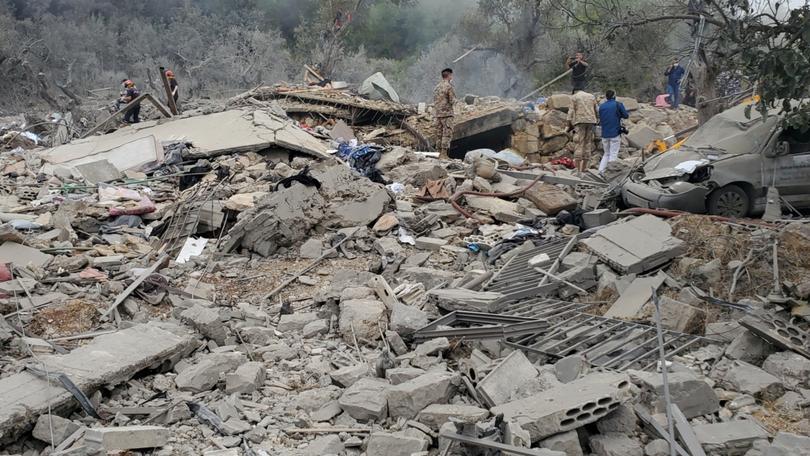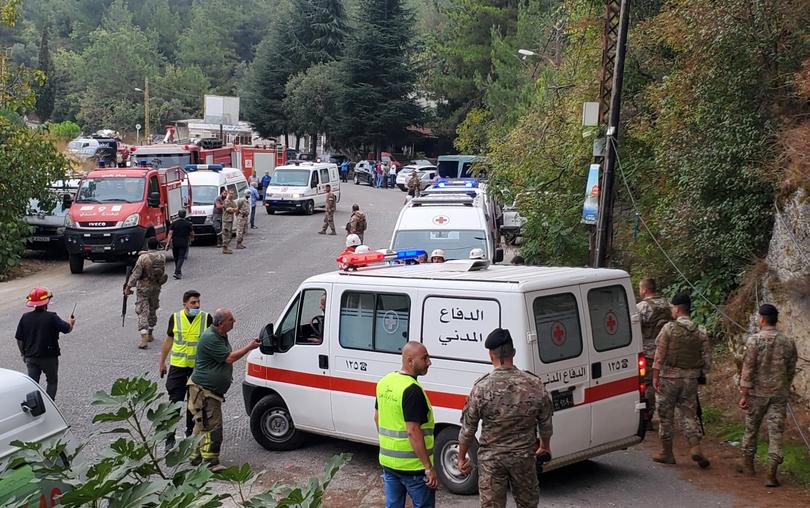Lebanon: Israeli air strikes kill 21 people in Aitou as IDF expands operations in country’s north
Israel has launched a string of new attacks on Iran-backed Hezbollah in Lebanon, with air strikes killing at least 21 people in an area not been previously targeted by the IDF.

Israel has launched a string of new attacks on Iran-backed Hezbollah in Lebanon, with air strikes killing at least 21 people on Monday local time.
The Israeli Defence Force targeted multiple sites, including Aitou, a Christian-majority town in the north of Israel.
In recent weeks, Israel has focused operations on areas of Beirut and the south of Lebanon, with the latest operation sparking concern that conflict is spreading.
Sign up to The Nightly's newsletters.
Get the first look at the digital newspaper, curated daily stories and breaking headlines delivered to your inbox.
By continuing you agree to our Terms and Privacy Policy.The strike in Aitou hit a house that had been rented to displaced families, Aitou mayor Joseph Trad told Reuters. In addition to the deaths, four people were injured, the Red Cross said.
Lebanon’s health ministry has confirmed that DNA testing will need to be conducted to identify the victims of the attack.

In the south, Israel ordered residents of 25 villages to evacuate to areas north of the Awali River, which flows east to west some 60km north of the Israeli frontier.
The Israeli military said it had killed Muhammad Kamel Naim, commander of the anti-tank missile unit of Hezbollah’s elite Radwan Force, in a strike in the Nabatieh area of south Lebanon.
Hezbollah did not immediately comment.
The operations come amid tensions between Israel and the UN peacekeeping force UNIFIL in south Lebanon, with Israeli Energy Minister Eli Cohen on Monday repeating a call by Prime Minister Benjamin Netanyahu for the UN troops to leave.
Israel and the United Nations have been trading accusations over the peacekeepers, as Israel keeps pushing forces through the area in an attempt to wipe out Iran-backed Hezbollah and its military infrastructure while it also battles Hamas in Gaza.
The UN said Israeli tanks had burst into its base on Sunday, the latest allegations of Israeli violations against peacekeeping forces.
Israel disputed the UN account and Netanyahu said UNIFIL was providing “human shields” for Hezbollah, an allegation Hezbollah denies.
Meanwhile, the entire Middle East remains on high alert for Israel to retaliate against Iran for an October 1 barrage of long-range missiles launched in response to Israel’s assaults on Lebanon.
The Pentagon said on Sunday it would send US troops to Israel along with an advanced US anti-missile system.
On Monday, the US embassy in Lebanon strongly encouraged its citizens to leave “now”, warning that additional flights laid on by the government to help US citizens leave since September 27 would not continue indefinitely.
The Israeli military took foreign journalists into southern Lebanon on Sunday and showed them a Hezbollah tunnel shaft that was less than 200 metres away from a UNIFIL position, as well as weapon stashes that the troops found.
Brigadier General Yiftach Norkin said the tunnels had been built a few years ago.
“We are actually standing in a military base of Hezbollah very close to the to the UN,” Norkin said, pointing to the shaft’s trapdoor in an area covered by undergrowth and overlooked by a UN observation post.
Since announcing its ground operation near the border, the Israeli military says that it has destroyed dozens of Hezbollah tunnel shafts, rocket launchers and command posts.
Hezbollah possesses an extensive tunnel network in southern Lebanon, which Israel estimates extend for hundreds of kilometres. A Hezbollah field commander told Reuters last week that the tunnels “are the foundation of the battle”.
UNIFIL has said previous Israeli attacks limited its monitoring abilities and UN sources say they fear any violations of international law in the conflict will be impossible to monitor.
European Union foreign policy chief Josep Borrell said on Monday that EU member states had taken too long to condemn Israel’s attacks on UNIFIL soldiers, describing them as “completely unacceptable”.
Spanish Prime Minister Pedro Sanchez urged EU members to respond to a request by Madrid and Ireland to suspend the bloc’s free trade agreement with Israel over its attacks in Lebanon and Gaza.
EU countries, led by Italy, France and Spain, have thousands of troops in the 10,000-strong peacekeeping mission.
The conflict between Israel and Hezbollah resumed a year ago when the militant group began firing rockets at Israeli positions in support of Hamas at the start of the Gaza war, and has escalated sharply in recent weeks.
Israel says its operations in Lebanon are aimed at securing the return of tens of thousands of people displaced from their homes in northern Israel.
- With Reuters
